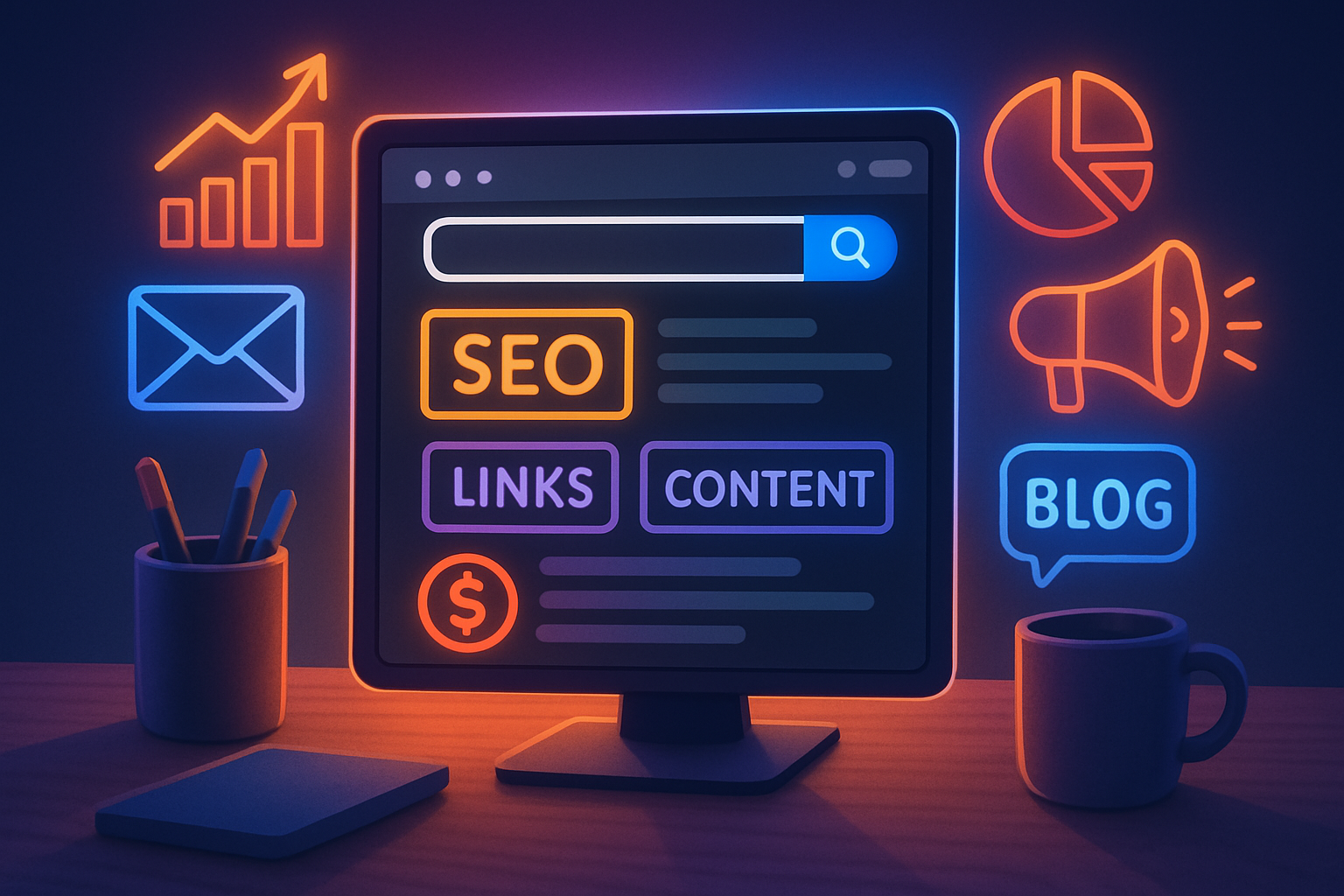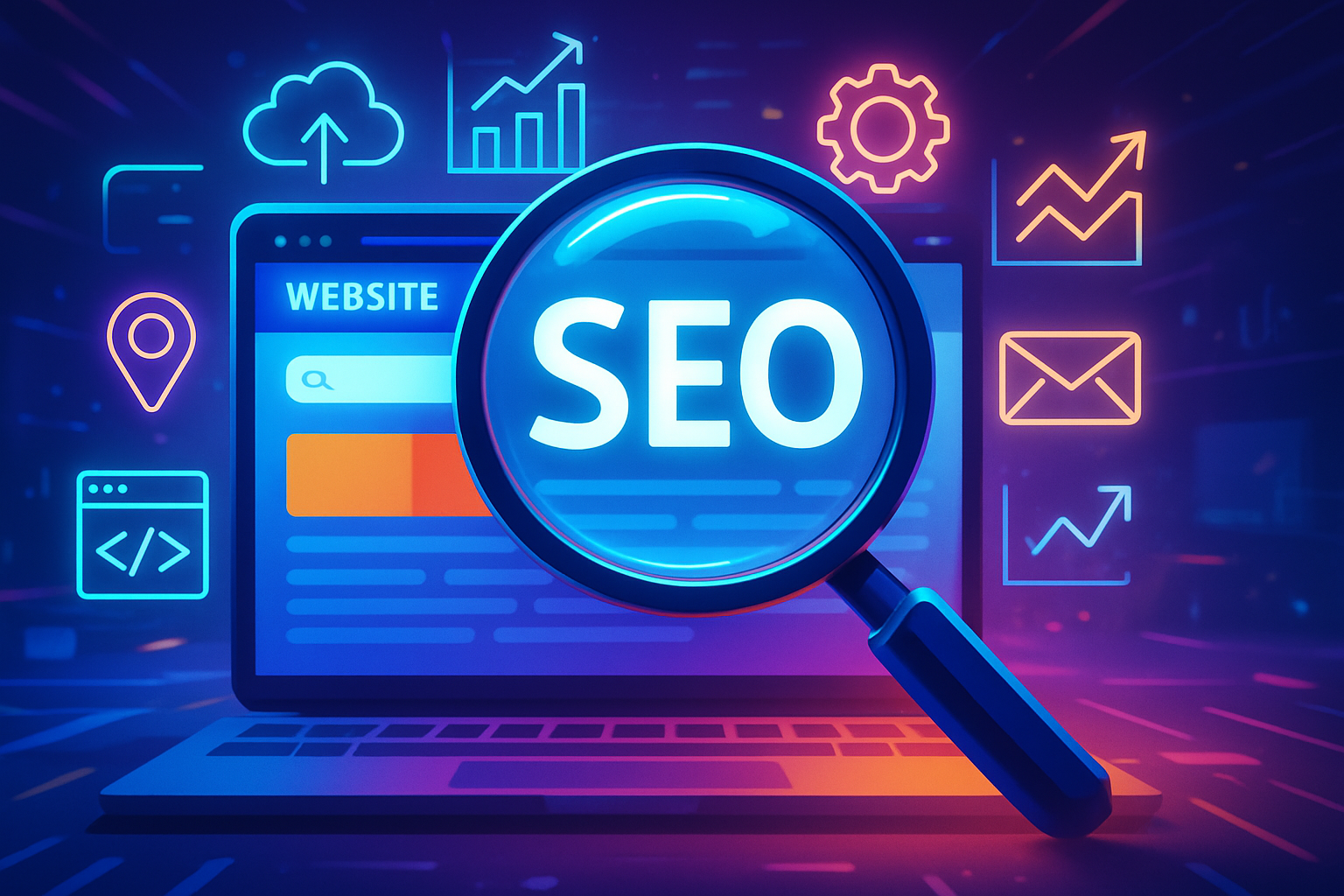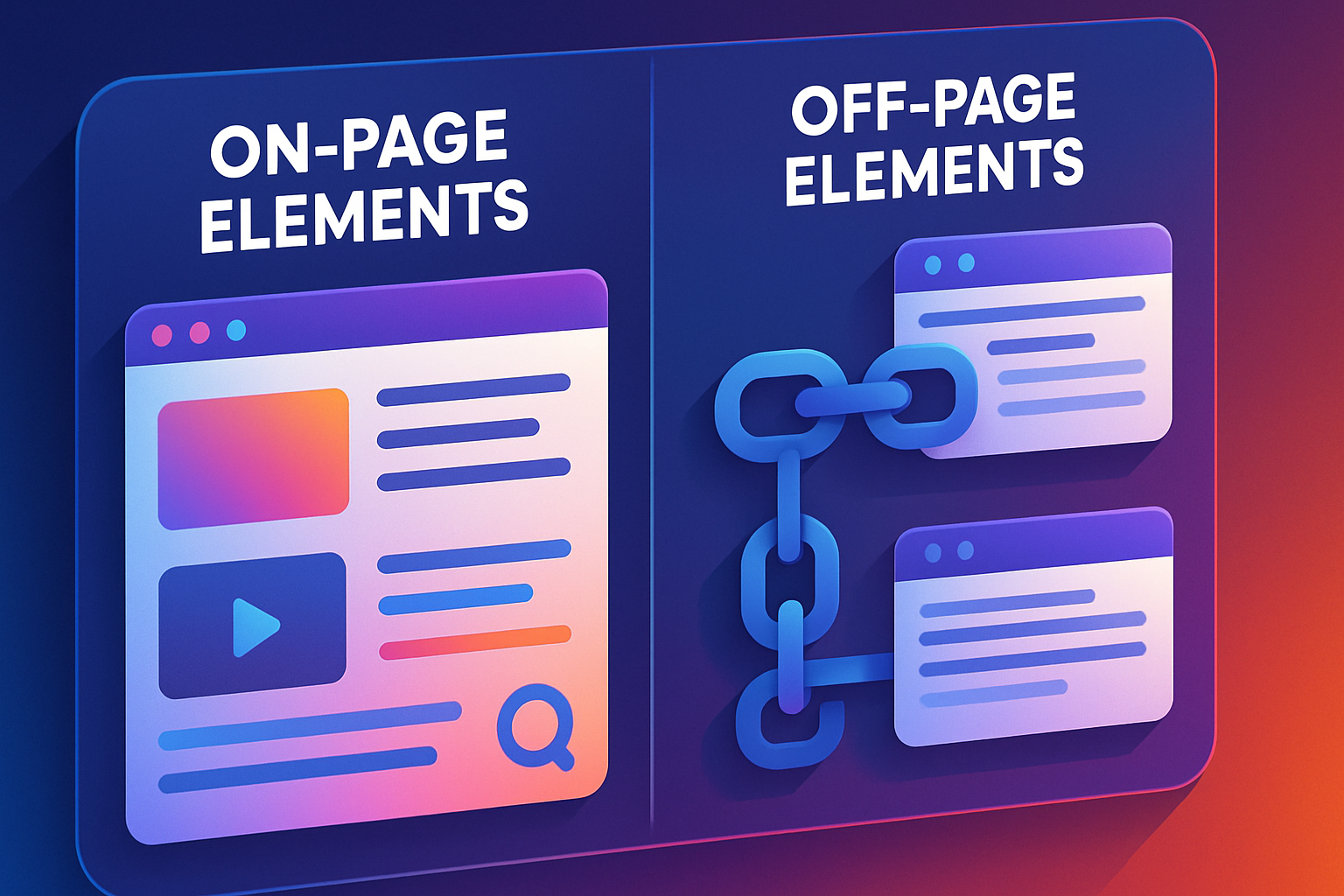What Is SEO and How Does it Work?

Key Highlights
Search Engine Optimization (SEO) is a crucial component that enhances online visibility and drives organic traffic to websites.
Effective keyword research and implementation elevate your website’s relevance in search engine results.
Technical SEO ensures site structure, crawlability, and mobile optimization to improve user accessibility.
A proper digital marketing strategy integrates SEO to boost rankings and amplify brand awareness.
Consistent optimization of content marketing supports better engagement while improving user experience.
Leveraging backlinks creates authority, positioning your site as a trusted resource.
Introduction
Do you want your website to stand out in this busy digital world? Search Engine Optimization (SEO) can help you with that. SEO should be a key part of any strong digital marketing plan. It helps your website traffic grow and lets your business show up better in search results. When you improve your content and take care of some technical changes, SEO will make your site meet what an online search engine wants. If you want more people to see your website or if you want your brand to be known, SEO is important for your online presence.
The Basics of SEO (What is seo and how does it work)
 Have you ever thought about how search engine optimization (SEO) really works? It all begins with the target audience and what they need. You need to know your people. When you use content marketing, you give users something valuable and connect with them. Good content is important. The basics of SEO are about matching your site’s structure, keywords, and making sure the design is easy to use.
Have you ever thought about how search engine optimization (SEO) really works? It all begins with the target audience and what they need. You need to know your people. When you use content marketing, you give users something valuable and connect with them. Good content is important. The basics of SEO are about matching your site’s structure, keywords, and making sure the design is easy to use.
To make a strong SEO strategy, you should make your site easy for people to use and simple for search engines to understand. When you focus on user experience, your site is better for everyone. Both steps will help the search engine see your site. This is how you get seen more online while making sure your site works well with search engine algorithms.
What Does SEO Stand For?
The short form SEO means Search Engine Optimization. This is when you work to raise a website’s spot on search engine results pages (SERPs). The goal is to bring organic traffic to your website without paying for ads. In digital marketing, SEO builds a link between the words people type in the search engine and where your pages show up. It makes sure your content and website layout help you get noticed by users.
When talking about online marketing, SEO lets a business be seen by more people. It helps your site gain more trust and respect. It does this by using the same words your users search for, which are called keywords. With search engines acting like doors, a site with good SEO stands out from the crowd and gets more visits.
In the end, SEO helps websites get steady, good-quality visitors by following how big platforms like Google work. This gives your website better search engine rankings and shapes your online presence. By using strong SEO, you grow brand trust and keep getting found online for a long time.
Key Concepts in SEO
To master SEO, it’s important to know the key ideas behind it. Keyword research is where you start. It helps you find search terms that are important to your audience. These keywords be in the content, making sure it speaks to what users want and brings website traffic to your site.
Another thing that matters a lot is content quality. Great content keeps people interested and gives them what they expect. When you mix this with backlinks, your website builds stronger domain authority. This makes your site seem more trusted to search engines.
It is also important to know about user intent. When you match what people are searching for with what your site gives, you create real value. SEO works best when you focus on these big ideas, like using the right keywords and paying attention to details. This is how you support things like domain authority, user intent, website traffic, keyword research, and content quality.
How Search Engines Work
 Are you interested in how a search engine works? Let’s look inside these systems. A search engine uses special software, called search engine crawlers. These crawlers go out and look at webpages all over the web. They collect data by crawling these pages. Then, that data gets stored and organized by a process called indexing. After that, search engine algorithms look at this information and sort it.
Are you interested in how a search engine works? Let’s look inside these systems. A search engine uses special software, called search engine crawlers. These crawlers go out and look at webpages all over the web. They collect data by crawling these pages. Then, that data gets stored and organized by a process called indexing. After that, search engine algorithms look at this information and sort it.
When you enter a search, these systems start working. They use what the search engine knows to put out a list of results for you. These results show up in a certain order that matches what you are looking for. If you want your site to show up in the search engine, it is important to understand how these systems and their search engine algorithms work. Read on to see more about these important processes.
Crawling and Indexing Explained
Crawling is the first main step that a search engine uses. Bots known as search engine crawlers go through each webpage to see what’s there and how it is set up. Sometimes, these crawlers do not get into parts that need a password or have too many pictures, and this can make it hard to index those sections.
After crawling, the data goes on to indexing. This happens when the search engine puts your website’s information into a special database. What your site is about and how it is built are both big factors in how easy it is to find the site later.
Good crawling and indexing help your site be seen in search engine results pages (SERPs). If these steps are missed, your website does not show up, even if the content is good. This is why you want the search engine crawlers to find your site and help it place well in organic results.
Ranking Algorithms and SERPs
Ranking algorithms are the rules search engines use to decide where websites appear on the search engine results pages (SERPs). The algorithms look at things like content quality, keyword use, and user experience to figure out these rankings.
These algorithms change often and use new technology like machine learning. This helps make sure that organic results match what people are looking for and give them accurate and useful information. For anyone working in SEO, it is important to keep up with these updates in the search engine algorithms.
If you set up your website the right way, you can move up in search rankings and get more organic traffic. A site that meets these standards can bring in more users and offer them valuable content.
Why Is SEO Important for Your Website?
 Picture your website like a shop front— you want people to see the site and find it with ease. That is why SEO is so important. A strong SEO strategy makes your online visibility better and brings in steady organic search traffic.
Picture your website like a shop front— you want people to see the site and find it with ease. That is why SEO is so important. A strong SEO strategy makes your online visibility better and brings in steady organic search traffic.
When you match the technical parts with what users want, SEO helps your website traffic grow. It be a cheaper way to boost your digital marketing work. Below, we talk about how SEO can help you reach special goals like building authority, trust, and making your site more visible.
Increasing Organic Visibility
Building organic visibility starts with getting found in search engine results. To do this, you need to use relevant keywords. These words should match what your audience is searching for. When you do that, your site is more likely to show up in organic search results.
Also, having clear and well-structured content can help bring in more clicks. This kind of content is important for growing brand awareness. An optimized page gives valuable insights, helps you connect with people, and shows that you know what you are talking about.
If you want more people to find your site, you should use these steps on a regular basis. Following these proven ways will give the site better reach and long-term results. Being smart and focused with your approach can help your site stand out in search results against others.
Building Authority and Trust
Building strong domain authority is very important in SEO. A website that has good backlinks from trusted sources can get trust from search engines and from people too.
Another key thing is content quality. Good, helpful content can answer questions people have. It gives extra value. This makes people want to stay on your site. They believe your site is a good place to get real answers.
When your brand gets mentions on other websites, that helps your reputation. It shows people that your site is real and matters. When you put all this together, it makes your website stronger and helps raise your search rankings.
Core Elements of SEO
 Every digital marketing plan leans on the main parts of SEO. On-page SEO is about the content and the code you use. Doing this right can help you show up more in searches. On the other hand, off-page SEO gets its power from links and working with other sites. This helps build trust outside your own page.
Every digital marketing plan leans on the main parts of SEO. On-page SEO is about the content and the code you use. Doing this right can help you show up more in searches. On the other hand, off-page SEO gets its power from links and working with other sites. This helps build trust outside your own page.
Technical SEO looks after your site’s setup. It helps your website run without trouble and lets search engines walk through your site easily. All these parts work together as one. You need all of them to make your seo content better and to get real results from your digital marketing.
Moving ahead, let’s talk about the best things you can do in each of these areas.
On-Page SEO Essentials
Good on-page SEO is very important if you want better search results and a strong user experience. You need to work on things like title tags, short and clear meta descriptions, and clear header tags to get your content in order. Do not forget about image alt texts and linking your pages to each other. These will help with accessibility and help even more people find your content.
If you use these best practices, search engines can understand your pages better. This will make your website show up more in search results. Paying attention to these things will also help you build a great digital marketing strategy and get more organic traffic over time.
Off-Page SEO Techniques
Building a strong online presence means you need to use good off-page SEO techniques. One good way is link building. This helps your domain authority go up. It also helps your website show up better in search engine results. When you use social media platforms that make sense for your brand, you reach more people and boost brand awareness. This can also help bring in organic traffic through stuff made by users. Influencer marketing is another way to get your message out to your target audience. With this, you can make valuable content that many people see and share.
It is good to talk and work with industry experts too. This can help you get backlinks, which makes your site look better to the search engine. All of these steps help your site move up in search rankings and have a better online presence for your target audience.
Technical SEO Fundamentals
Technical SEO is very important because it helps search engines to crawl and index your website with ease. This helps you appear more often in organic search results. The way your site is built, how people move around it, and if it works well on phones, all play a big role in user experience. When you follow best practices, like using good URLs, simple meta tags, and strong internal links, your search rankings can go up.
You need to make sure your site loads fast and works on mobile devices too. This makes your target audience happy, keeps people on your site longer, and can bring in more organic traffic. Paying attention to these details helps with your digital marketing and can improve your overall digital marketing strategy. These small steps are key to getting the most out of organic search.
Site Structure and Navigation
A good site structure and simple navigation are important for search engine and user experience. When your website is well set up, it helps search engine crawlers understand what your content is about. This can help with keyword research and also support your digital marketing strategy.
When users can move around your website easily, they find what they need fast. This helps lower bounce rates and gets more user engagement. Using best practices, such as keeping a clear order, adding internal links, and choosing good title tags, can make your online presence stronger.
You should think about the user journey on your website. If people like the way the site works, they come back and stay longer. This helps draw in more organic traffic and makes your search rankings and domain authority better.
Mobile Optimization and Page Speed
Making sure that your website works well on phones and tablets is important. It helps boost user engagement and brings in more organic traffic. A design that changes to fit any screen not only works for all devices, but also matches what a search engine looks for. Most search engine algorithms like mobile-friendly websites.
The speed of your site is also key in digital marketing. Page speed can change bounce rates, and it affects search rankings too. There are a few ways to make your website faster. Try to use image compression, browser caching, and cut down on HTTP requests.
In the end, if you want a strong digital marketing strategy, you need to focus on how your site works on mobile, and also on its page speed. This helps your site do better with both users and search engines.
Keyword Research and Targeting
Effective keyword research is at the core of a good SEO strategy. With it, marketers can find relevant keywords that fit what their target audience is looking for. Knowing user intent is important here. It helps you pick the right words that match what potential customers type online. Using advanced tools matters, too. These tools help you get valuable insights, so your content can get more organic traffic and keep people interested. If you use relevant keywords, your business can boost its online presence and also raise its search rankings, even in busy markets.
Understanding User Intent
User intent is at the heart of good search engine optimization. To do well, you need to know what people are looking for on a search engine. This helps digital marketers plan their seo strategy to fit what users want, like when they look for info, directions, or want to buy something. When you understand user intent, the user experience gets better because you give people what they need. This makes them stay on your website longer and enjoy it more.
Using relevant keywords based on user behavior is important. This can help your website move up in search rankings. In the end, if you keep user intent in mind, you will not only make your content better, but you will also get more website traffic. This means your online visibility will increase.
Tools for Effective Keyword Research
Different tools help make keyword research faster and easier for digital marketers. These tools let you find relevant keywords that the target audience uses. They do this by looking at user behavior and what people want when they search, also known as search intent. Some well-known tools are Google Keyword Planner, SEMrush, and Ahrefs. These sites show you search volume, competition, and give valuable insights into consumer behavior. When you use these for keyword research, you will know more about your audience and online marketing. This helps you improve your SEO strategy and boosts organic search rankings.
Content Optimization Strategies
Building a strong content optimization plan starts with knowing what your users need. Make sure every piece of content on your site speaks to your target audience. When you give people valuable content that meets their needs, they stay longer and bounce rates go down.
Use relevant keywords naturally in your writing. This makes it easier for search engines to find your work in search engine results. Also, change title tags and meta descriptions so more people click on your links. Using best practices in content quality helps the user experience, brings more online visibility, and leads to more organic traffic.
When you work on content optimization, always think about the user intent. Give people some information that helps them, and they will come back to you next time. Good content brings more users and helps your page rank higher in search engine results.
Creating High-Quality, Relevant Content
Creating good and relevant content is key if you want strong search engine optimization. You need to know what your users want and make sure every piece of content you share answers their questions and meets their needs. This helps you connect with your target audience better. When you share valuable insights, you make the user experience better. This can help bring more people to your website and give you higher spots in search results for the search engine.
Using best practices in content marketing, like making your title tags and meta descriptions clear and useful, will also raise your online visibility. It is important that you focus on content quality. Doing this can boost user engagement and help people trust you more. Over time, this can shape a strong digital marketing strategy and make your website stand out in organic search results.
Optimizing Titles, Headings, and Meta Descriptions
Good optimization of titles, headings, and meta descriptions helps a lot with search engine results and can make user engagement better. When you use relevant keywords in these parts, it matches what people want when they search online. It also helps get more users to click on your link from the search engine page. Title tags should be interesting and give a clear idea of what the content is about. They should also meet the needs of the target audience. Meta descriptions act like a short invite that makes people want to find out more. When you set up headings in a clear order, the user experience gets better. This makes it easy for users to read and helps search engine crawlers see what the main topics are about, which can help your site show up higher in organic search results. Using these steps is a good way for us to keep up with what people are looking for and help search engines find your pages.
Link Building and Off-Page Authority
Building a strong link-building plan is important to help your off-page authority grow. When you get good backlinks from trusted sources, your website’s domain authority goes up, and you show up higher in search results. Working with influencers and being active on social media platforms can make more people know your brand. This can also bring more organic traffic to your site. Guest blogging and outreach to others help make your online presence even stronger. All these steps are part of a comprehensive SEO strategy that helps you match user intent and makes for a better user experience.
Earning Backlinks from Credible Sources
Building backlinks from credible sources is key for a good off-page SEO strategy. When you have backlinks from websites with high domain authority, your site will look more reliable. This step helps your search engine rankings go up. You can write guest blogs or make high-quality, shareable content to get these important links. Also, using social media and the right social media platforms will help your site be seen by more people. This can help you make connections that may lead to organic backlinks. Working with influencers or industry experts not only helps you grow your brand awareness but can also bring in more referral traffic. These steps will improve your overall online presence.
Social Signals and Brand Mentions
Adding social signals and brand mentions to the digital marketing strategy can really help improve online visibility. Social media platforms are great places to boost brand engagement. When people interact with your brand on these sites, it can even affect your search engine rankings. Also, when other sites mention your brand, it can help increase your domain authority because search engines see these mentions as good signs. This works well together to build trust with people and brings more traffic from organic search results. Plus, it helps improve user experience. Focusing on user engagement and having real talks on social media platforms makes your online presence stronger and more connected.
Measuring and Improving SEO Performance
Evaluating SEO performance is important if you want to see how your digital marketing and marketing efforts are working. When you look at key numbers like organic traffic and bounce rates, you get useful and valuable insights about user behavior and see how people are using your website. Tools like Google Analytics help you track search rankings and see how well your website is really doing in search results.
Having a comprehensive SEO strategy lets you keep up with new trends and any changes in algorithms. When you keep an eye on these things all the time, you can make your link building and content optimization better. Over time, this will help improve your website’s presence in search results and increase brand awareness with your target audience. This way, you get to know what people like and make changes that will help your business grow.
Essential SEO Metrics and Tools
Tracking the right SEO metrics is key if you want to make your digital marketing strategy better. Things like organic traffic, bounce rates, and conversion rates show you how people use your website. These numbers also help you see if your content works well. You can use tools like Google Analytics and SEMrush to check your search rankings and see how your domain authority is doing over time.
Keeping an eye on these numbers lets you make fast changes when you need to. This can help with page optimization and improve the user experience. If you focus on relevant keywords and try to understand user behavior, your website’s presence in the search engine results will get better. This will help bring in more good quality traffic to your site.
Adapting to SEO Trends and Algorithm Updates
Staying relevant in search engine optimization means you need to focus on the latest trends and any changes in search engine algorithms. You should always watch how people act online and what their search intent is. This helps your website keep up with updates in the search engine and not fall behind. Being able to change your plan and how you work is important, so you do not miss any new chances to grow and keep or improve your place in the search results.
It is important to use quality content and follow best practices in every part of your website. This will help your online visibility so more people see your site. You also need to keep learning new things about search engine optimization. Try using new and quick ways of doing your job, so your work keeps being good for your target audience. This way, the things you do will match what people look for online and help you reach them better.
Conclusion
Adding search engine optimization to a strong digital marketing strategy is key if you want good online visibility and more website traffic. When you know user intent and use keyword research, you can make valuable content that connects with your target audience. It’s important to keep an eye on search rankings and watch for new SEO trends. This helps you keep getting better results over time.
If you focus on best practices in technical SEO, content optimization, and link building, you set up a solid path for organic search growth. In the end, a comprehensive SEO plan is great for brand awareness. It also gets the most out of all your marketing efforts.
Frequently Asked Questions
What are the main types of SEO?
The main types of SEO are on-page SEO, off-page SEO, and technical SEO. On-page SEO is about making changes to each web page so it can perform well. Off-page SEO helps your website grow its trust and rank higher by getting links from other websites. Technical SEO makes sure that a website is easy to find, load, and use. All these types help websites show up better in search results.
How long does it take to see results from SEO?
You will often see SEO results in about three to six months. This can change depending on things like competition, how hard keywords are, and the strength of the website. If you keep working on updating content and building backlinks, you will usually start to see steady growth. Over time, your rankings get better and you get more organic traffic.
Can I do SEO on my own or should I hire an expert?
Yes, you can do SEO by yourself if you take the time to learn and use the right strategies. Keep in mind that it may take some time to be good at this. If you hire an expert, you might see faster results because they know a lot about technical SEO and other changes that happen to search engine rules. They also understand how to work through any challenges you may face.
How often should SEO strategies be updated?
It is a good idea to update your SEO strategies every 6 to 12 months. But if there are big changes in search algorithms or a change in user behavior, you may need to update them more often. It is important to stay informed about best practices. This way, your strategies will keep working well and match what is needed right now.
What are the biggest mistakes to avoid in SEO?
Common SEO mistakes are easy to make. Some people forget about page optimization. Others do not check if a website works well on phones. Many skip keyword research, which is important. Some do not pay attention to how fast the site loads.
It is also common to ignore how well the website is doing. Doing bad things to get more links can hurt your site too. These actions can make your website less seen or trusted.
Try not to make these mistakes. When you avoid them, your website will get better results.
